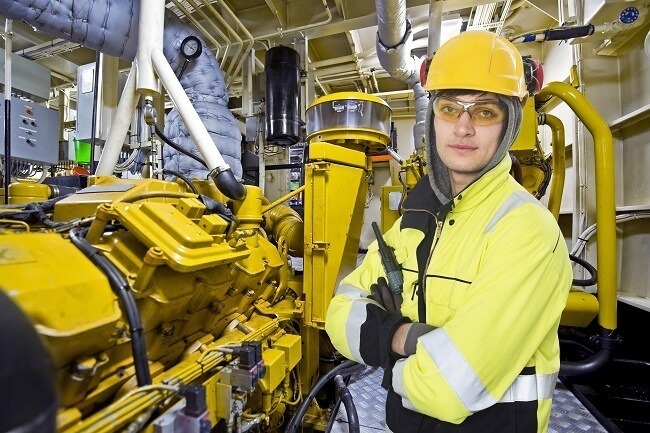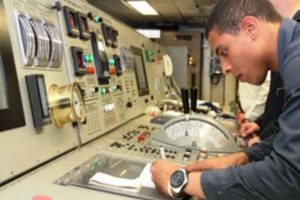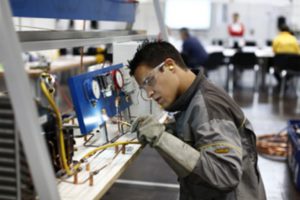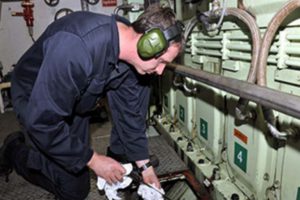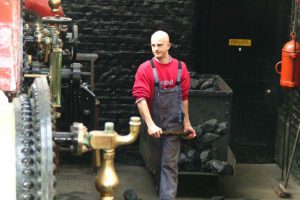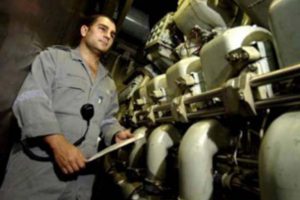Engineering Officers & Ratings Courses
Marine engineering work on board ships include safe operations and monitoring of numerous systems, like:
- mechanical, electrical, hydraulic and control equipment
- sophisticated engine management systems
- maintenance and monitoring of the machinery space
Chapter 3 of the STCW Code for Standards Regarding Engine Department (Certification) address the requirements for engineering officers and ratings. STCW III/1 – 7 address the requirements as follows:
- Officers in Charge of an Engineering Watch in a manned engine-room or as designated duty engineers in a periodically unmanned engine-room
- Chief Engineer officers and Second Engineer officers on ships powered by main propulsion machinery of 3,000 kW propulsion power or more.
- Chief Engineer officers and Second Engineer officers on ships powered by main propulsion machinery of between 750 kW and 3,000 kW propulsion power
- Ratings Forming Part of an Engineering Watch in a manned engine-room or designated to perform duties in a periodically unmanned engine-room
- Able Seafarer Engine in a manned engine-room or designated to perform duties in a periodically unmanned engine-room.
- Electro-Technical Officers
- Electro-Technical Rating
The responsibilities are broadly broken up into two categories:
Management Level:
- Chief Engineer, and
- Second Engineer (First Assistant Engineer)
Operations Level:
- DDE (Designated Duty Engineer) or the Engineer Officer of the Watch (EOW- 4th engineer and 3rd Engineer)
- Electro-technical, and
- Ratings who are part of an Engineering Watch and who must understand orders of the certified engineering officers relevant to watchkeeping duties, carry out a watch routine compliant with the duties of an engine room watch, and more.
Table A-III/2 of the STCW Code govern the responsibilities, tasks and duties of management level. Candidates for certification as chief engineer officer and second engineer officer of seagoing ships powered by main propulsion machinery of 3,000 kW power or more are required to demonstrate ability to undertake the tasks, duties and responsibilities listed in column 1 of STCW Table A-III/2.
Chief Engineer /First Assistant Engineer
Training programs for Chief and First Assistant Engineers include:Engineering principles and application of thermodynamics for climate control and efficient
Designated Duty Engineer (Blended)
A designated duty engineer (DDE) is defined by STCW as the engineer in charge of a watch in a periodically unmanned engine room. Under US regulations, the DDE may serve as a Chief Engineer
QMED01 Junior Engineer: Q800-Q801
This is a program required for those seeking a QMED – Junior Engineer endorsement. The course provides cognitive and practical mechanical skills required of engineering plant maintenance
QMED02 Electrician-Refrigerating Engineer: Q802 – Q803
This course provides an Engine Department personnel with the theoretical and practical knowledge and the skills necessary to perform maintenance and repair operations
QMED03 Oiler: Q804 – Q805
This program is designed for entry level engine room mariners. The program satisfies the training requirements for the General Safety, and Oiler examination modules.
QMED04 Fireman-Watertender: Q806-FWT
The QMED04 Fireman-Watertender course is more suitable for a steam propelled vessel. The course includes knowledge of associated machinery and procedures, and a final exam.
QMED05 Machinist-Pumpman: Q807 – Q808
This course covers the requirements of the STCW Convention as amended Chapter V, Section A-V/1-1. The course provides the detailed knowledge to support the training outcomes

